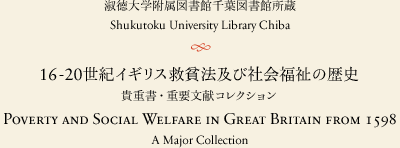 |
 |
 |
 |
1821 - 1826
THE CHRISTIAN AND CIVIC ECONOMY OF LARGE TOWNS
THOMAS CHALMERS'S MOST IMPORTANT WORK ON THE POOR |
115. CHALMERS, Thomas. The Christian and civic economy of large towns.
Volume I. Glasgow: Printed for James Starke. 1821. [4][,358,[2]p. with Volume II.
Glasgow: Printed for Chalmers and Innes. 1823. [4],365p. with Volume III.
Glasgow: Printed for William Clowes. 1826. xv,408p. Nineteenth century half calf,
hinges weakening and some wear. Some light dampstaining in volume 3. But a good
set of Chalmers's Major work on poverty and now extremely rare.
GOLDSMITHS 23250.
According to an advertisement at the back of volume one, the work was originally
issued in quarterly numbers, priced 1 shilling. The first volume was then issued
complete, in boards, for 8s and 6d. Volume II followed in 1823 and volume III in
1826. The three volumes are needed to make up the complete set but the method of
issue means that volumes not infrequently turn up on their own. The complete set is
rare.
Volume I contains a chapter on Sabbath Schools; Volume II chapters On the bearing
which a right Christian economy has upon pauperism, On the present state and future
prospects of pauperism in Glasgow, On the difficulties and evils which adhere even to the
best condition of Scottish Pauperism, On the likeliest means for the abolition of Pauperism
in England, On the likeliest Parliamentary means for the abolition of Pauperism in
England, and On the likeliest Parochial means for the abolition of Pauperism in England.
Volume III, probably the most important for Chalmers's theories of poor-relief,
contains chapters on The wages of Labour in which he strongly supports Malthus,
calling his theory of population `quite incontrovertible', On the effect of a Poor-Rate,
when applied in aid of defective wages, On Savings Banks, On certain prevalent errors
and misconceptions, which are fostered by Economic Theories, and which are fitted to
mislead the Legislature, in regard to Labour and the Labouring Classes and On Mechanic
Schools, and on Political Economy as a Branch of Popular Education. The second chapter
On the effect of a Poor-Rate, when applied in aid of defective wages contains a powerful
argument for keeping `Charity' as separate from `Wages' as possible; `When charity
is altogether detached from remuneration of labour, this of itself will keep off a very
wide and wasting contamination from the spirit of our peasantry, and they will again
recover the honest pride of independence.' This theme of independence and self help
leads logically to the next chapter which is on Savings Banks.
Thomas Chalmers (1780-1847) was the most important nineteenth century authority
on the poor in Scotland. Like Townsend, he took . the view that pauperism was an
artificially induced disease of society, and unreservedly accepted from Malthus the
"Principle of Population" and the theory of the Wage Fund, which rendered all
expenditure on the Poor Relief illusory and positively mischievous. He believed that
the Poor Laws were a "bungling attempt of the legislature", to do that which would
have been much better done had nature been left to her own free process. His oft-
repeated maxim was "The proper remedy of Nature, for the wretchedness of the few,
is the kindness of the many". Accepting the logic of his own position he preferred
even the worst problems of begging and mendicity to the evils of legal intervention
under the Poor Law. He was a strong advocate for its abolition and his writings
exercised considerable influence upon Edwin Chadwick and Nassau W. Senior. The
"discovery" of the idea that pauperism was an artificial disease of society was perhaps
the single most important idea which led to the Poor Law Amendment Act of 1834.
|
 |
|
 |
 |
 |
 |
|



